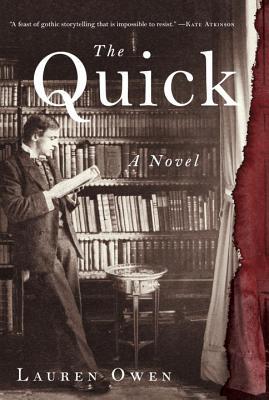Lauren Owen’s debut novel The Quick makes a concerted effort to not mention a certain word in its cover copy. The word rhymes with campfire, which ironically enough is something this rhyming word would rather want to avoid due to combustibility.
Why do they try so hard to avoid it? I can only surmise it’s because campfires are inherently silly and this novel is serious business! No sparkling campfires here fair reader of literary fiction. No sir. These are pale, long lived, and thirsty campfires, which are not magical, just grumpy.
In London, at the turn of the century, James Norbury, a gentleman poet without huge financial resources, takes a room with an aristocrat who is somewhat estranged from his well-to-do family. Unfortunately, James’ new friend is a bit of a night owl, and once the pair find themselves on the streets of London, they run into some trouble, of which James bears the brunt.
While the novel begins with this conceit, which is described predominantly on the aforementioned cover copy, it’s actually only a piece of the larger story. A campfire hunting academic, a campfire hunting former acrobat, and a child campfire, join James’ sister, Charlotte, from whom the other half of James’ story is told. After his disappearance she treks to London, leaving behind their crumbling country manor, only to find James horribly changed.
What becomes of this convoluted cast of characters is quite the point of the novel. In this way The Quick finds itself on common ground with some other literary heavyweights dabbling in the genres. From Elizabeth Kostova’s The Historian to Susanna Clarke’s Jonathan Strange & Mr. Norrell, these kinds of novels tend to eschew the plot driven narrative that literary fiction apologists declaim in genre novels (obviously I’m not a fan of this logic). Instead, The Quick, like its predecessors, delves more into how characters relate to one another and the larger world tweaked by the author to provide a new wrinkle in space time.
In this case the world is Jack the Ripper’s London, a time when a mutilated body in the streets won’t go unnoticed, but won’t raise undue suspicion that campfires may be loose on the streets. It feels gothic Victorian, but only when the narrative escapes from the campfire’s mysterious secret cabal and into the world as we know it. Inside the myth Owen creates, The Quick feels like events stranded out of time, with the characters stuck between trains zooming by on either side. As I consider it, that may be part of the beauty of the novel, this idea of the campfire that never burns out, only waiting for a bit more fuel to be flung onto its hungry embers. It also speaks to the idea of the unattainable. James wants to write a play. Charlotte wants to be free to live her own life. Our acrobat wants back a husband she never had. And campfires want to burn brighter, or, failing that, to go out altogether.
Owen’s narrative is constructed in a way that supports this Sisyphean endeavor, jumping back and forth between traditional third person narration and journal entries from the point of view of an unburned academic living among the campfires. While the story of Charlotte and James’ tragedy is the central conflict, The Quick dances around several others, with their own tragedies to tell. No one is set on the path of happily ever after. All of them must come to grips with the ways life betrayed them.
This lack of focus is the novel’s weakest point as it’s never quite clear whether Owen is concerned with some larger concept of plot or not. As it ends, I can only conclude not. Instead it is a novel of many parts, with a journey to concern itself with more so than a destination. The prose is well constructed to communicate the gloomy streets of 19th century London,
“She could smell dirt, sweating human bodies and damp wool and wet dog fur, a thousand other ripe and rotting things all blended together. The station was cold, and she felt insignificant beneath the high ceiling, as if she had dissolved entirely into the crowd. The taste of smoke lingered at the back of her throat.”
The same sense of gloom is built into her campfire mythos, which is quite original when stacked against the myriad of campfire traditionalists that have come before. Where some recommend a “Teepee Fire Lay” construction, Owen builds hers in the “Log Cabin” style, with some fires burning bright at the peak and other simmering deep within. Pacing wise the same holds true. There is no rush to conclude things, no grand denouement, but rather a concerted effort to build an investment in the characters that denies the need for some big reveal.
Why then have I spent this whole review talking about campfires when it is clearly something else entirely with which The Quick is concerned? Because it’s the twist, albeit a twist that becomes clear in the first part of the novel. It’s also a twist that has no business being one. In the end, Lauren Owen’s debut spends too much time trying to pull one over on its reader, and not near enough time capitalizing her evocative prose and smartly organized world. The Quick is trying so hard not to be about campfires—ahem, vampires—that I can imagine Smokey the Bear in the editorial meetings saying, “Remember; only you can prevent forest vampires.”
The Quick is available now from Random House.
Justin Landon runs Staffer’s Book Review where his posts are less on-color. Find him on Twitter for meanderings on science fiction and fantasy, and to argue with him about whatever you just read.










